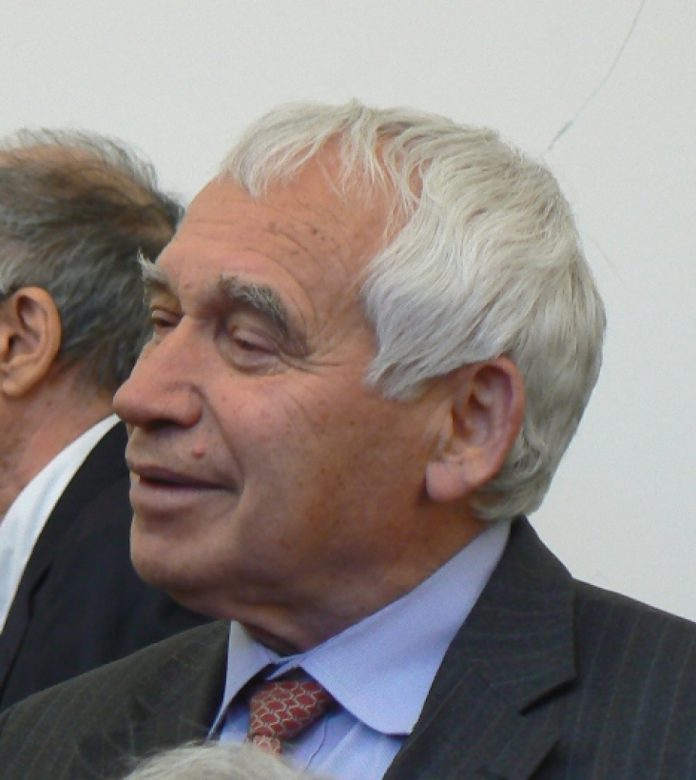By Rumyana Vakarelska
Farewell to Dr. Jeliu Jelev, Bulgaria’s first democratically elected President between 1990 and 1997, who passed away today. He was one of the few members of the Bulgarian intelligentsia, who became not only a leading political figure, but the most important Bulgarian leader in recent times. As a historian and a philosopher by original academic upbringing, he was among a few to write and make Bulgaria’s contemporary history at the same time.
His last public appearance took place just two days ago at the Bulgarian Presidential Institution, where Rossen Plevneliev, the current Bulgarian President, has invited for a meeting all his predecessors, starting with Dr Jelev, according to the Bulgarian National Television (BNT).
Dr. Jelev’s most important piece of work ‘The facism’, made him one of the most prominent Bulgarian dissidents in pre-1989 Bulgaria, also paying a high personal price for publishing the work, as it proclaimed the right of political opposition. In addition, he criticised the Bulgarian totalitarian regime under Todor Zhivkov’s rule, the former Secretary General of the Bulgarian Communist Party and the leader of the country until 1989.
His renowned book was published in 1982 and translated in 10 foreign languages, but was banned for sale in Bulgaria itself. In 1988 he created a political club that eventually became the predecessor of the Union of the Democratic Forces (UDF), the first right-of the centre party in post-Communist Bulgaria. He led the mass demonstrations in 1989, one of which represented Bulgaria’s anti-communist revolution. After being elected as an MP in the Great Seventh National Assembly in 1990, his candidacy has been put forward for Bulgaria’s President.
His work and influence in Bulgaria’s public life and his role as the first democratically elected President in 1990 is very much alike the work and life of Vaclav Havel’s in the Czech Republic, the playwright who led his country’s anti-communist ‘Velvet Revolution’. Jelev’s personality defined the emergence of a new more democratic society in Bulgaria, uniting for the first time personalities and even parties with conflicting political views and goals. Many of his supporters have left Bulgaria in the 1990s, as the Bulgarian intelligentsia struggled at large to become a leading force in the Bulgarian contemporary politics.
One of Dr. Jelev’s closest circle and a representative of the next generation UDF politicians was Stefan Tafrov, who became a notable Bulgarian career diplomat after a span in journalism. He served as one of Bulgarian ambassadors to the UK, while Ivan Stanchov, another notable Bulgarian in the UK, was the first Bulgarian ambassador to the UK to invite Dr. Jelev in London in the early 1990s as the new Bulgarian President. During his term, Dr Jelev has visited London a few times, as well as attended the services at the Bulgarian St. Ivan Rilsky Church.
Following an announcement of the Bulgarian National Assembly and the Bulgarian government, February 1, 2015 has been declared, as a day of national mourning.
A vigil in memory of Jeliu Jelev will take place at Alexander Nevsky Cathedral in Sofia starting at lunch on February 1, while a commemorative prayer for Dr. Jelev will be held at the end of the Sunday service at St ‘Ivan Rilsky’ church in London at UK’s lunch time. A commemorative book for Dr. Jelev will be available for members of the public to sign at the Bulgarian Embassy in London on February 2 and February 3 during office hours.
Moving froward without Dr. Jeliu Jelev will be hard. He left us aged 79 leaving many questions for us to answer. On Sunday, as usual he will once again get thousands together to pay their tributes to him and the historic era he started.
Now he has become one of the most important entries in the same very books himself. His fellow historians will have to continue the writing, possibly not far away from Jelev’s beloved St. ‘Kliment Ohridksy’ University in Sofia, where so many of his students and followers at home and abroad grew up, some of them making their own historic contributions. On Sunday, as usual he will once again get thousands together to pay their tributes to him and the historic era he started.
Bulgarian political parties often struggle to unite to move key issues forward, now without Dr. Jelev, the ultimate unity figure in the Bulgarian contemporary politics and society, they might be willing to try again. The leaders of all Bulgarian political parties have expressed their deep condolences for Dr. Jelev’s death, regardless of their political convictions. The writing about Dr. Jelev as a historic figure has only begun.
Copyright2015@Rumyana Vakarelska, Team New Europe. Email:rumy.vakarelska@gmail.com





















